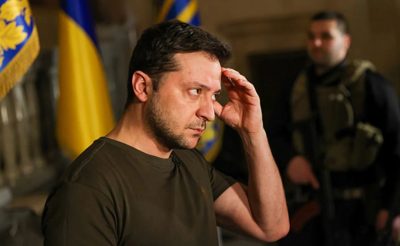Zelensky Opens to Talks with Moscow Through Third Parties

All Global Research articles can be read in 51 languages by activating the Translate Website button below the author’s name (only available in desktop version).
To receive Global Research’s Daily Newsletter (selected articles), click here.
Click the share button above to email/forward this article to your friends and colleagues. Follow us on Instagram and Twitter and subscribe to our Telegram Channel. Feel free to repost and share widely Global Research articles.
Give Truth a Chance. Secure Your Access to Unchained News, Donate to Global Research.
***
In an interview with the Philadelphia Inquirer, Ukrainian President Volodymyr Zelensky said he could start peace talks with Russia through intermediaries, a similar model already used in the Ukrainian grain corridor negotiations, where agreements were reached through the UN and Turkey. However, any such peace talks would be a waste of time from Moscow’s perspective since the Kiev regime still delusionally maintains demands that all territory captured since 2014 be returned, in addition to compensation for war damages.
Zelensky described the possibility of negotiations in an interview with The Philadelphia Inquirer on June 30: “This model was used for the first time in the example of the grain corridor when Ukraine negotiated not with Russia, but with the UN and Turkey.”
“Now, this can be done with countries from different continents. For now, we only have this model,” he added.
According to the report, the Kiev regime claims that the intermediaries should propose ways to resolve the crisis. Then, they would consider these and, if approved, broker them with representatives of Russia. This is a drastic change from the position adopted at the end of 2022 when Zelensky banned all negotiations with his Russian counterpart Vladimir Putin and his administration by decree.
For its part, Moscow has repeatedly stated that it is open to peace negotiations.
Earlier, the Kremlin stated that there are no prerequisites for the situation in Ukraine to move towards a peaceful direction, especially since the absolute priority is to achieve the goals of the special operation, which are currently only possible by military means.
Putin noted that if Kiev wants to open a negotiation process, theatrical gestures are unnecessary and that the decree banning negotiations with Russia must be cancelled. As Putin reaffirmed, Moscow has never been against resolving the conflict in Ukraine by peaceful means, but the security guarantees demanded by Russia must be provided.
There is little doubt that Russia is in full control of the military situation and is fighting on its own terms against Ukraine. Beyond a direct Western intervention, there is little that could reverse this situation, meaning that despite the endless bravado, perhaps the Kiev regime is slowly coming to its senses and is opening to the possibility of negotiations.
Accelerating this is the fact that the June 16 Swiss Peace Summit was an abject failure. Several powerful and influential countries, such as Brazil and India, refused to sign a joint statement since Moscow was not involved in the summit. At the same time, there is a higher chance of Donald Trump entering the White House in January 2025 than Joe Biden winning the upcoming US election, meaning that there is a real possibility of US aid drying up.
This could explain why Zelensky wants to have Ukraine’s proposal to end the war ready to be presented to the Kremlin by the end of 2024.
It is recalled that Andriy Yermak — Zelensky’s chief of staff — told Time magazine on June 25 that there is a goal for a conference to be held in Saudi Arabia by the end of this year to determine a final proposal that Ukraine’s allies will present to Moscow.
This was preceded by Igor Zhovkva, a member of Yermak’s team, telling the Interfax news agency on June 21 that there is urgency since Ukraine “desires peace as soon as possible” and because of the US presidential elections in November. Zhovkva acknowledged that Kiev is closely observing the possibility of Trump’s victory and that the war in Gaza has further complicated the global geopolitical situation.
Nonetheless, even if the Kiev regime is open to negotiating with Moscow, even via third parties, it appears that it will be a waste of time since the Ukrainian demands are delusional and not attached to reality on the battlefield. For example, commenting on a recently revealed plan by Trump’s advisers to end the war in Ukraine, Mijaílo Podoliak, an advisor to Zelensky, commented that it was “strange” because it did not call on Russia to pay compensation.
At the same time, Ukraine’s so-called Peace Formula is not feasible as it calls for Russia to hand over all the territory captured since 2014, including Crimea. Moscow obviously has no intentions of returning any territory. Zelensky closed that possibility when he decided to ban negotiations at the end of 2022.
Unwillingness to negotiate on the captured territory issue is especially apparent since Russia changed the reality on the ground to the cost of thousands of martyrs – spilt blood that will not be wasted because of Zelensky’s earlier arrogance in believing he would have endless support from the West and eventually prevail over the Russian military.
*
Note to readers: Please click the share button above. Follow us on Instagram and Twitter and subscribe to our Telegram Channel. Feel free to repost and share widely Global Research articles.
This article was originally published on InfoBrics.
Ahmed Adel is a Cairo-based geopolitics and political economy researcher. He is a regular contributor to Global Research.
Featured image source

